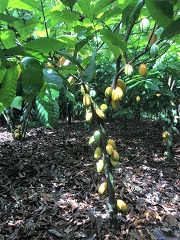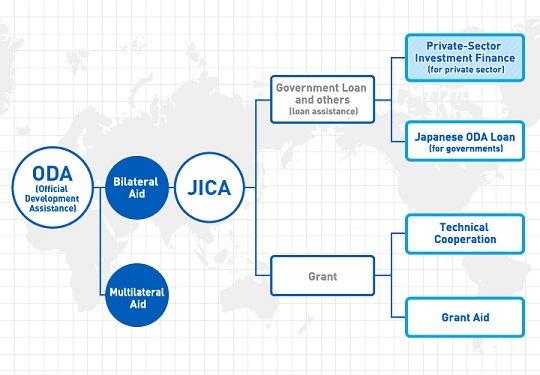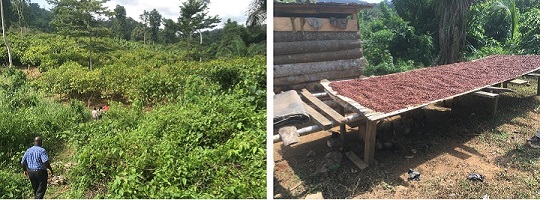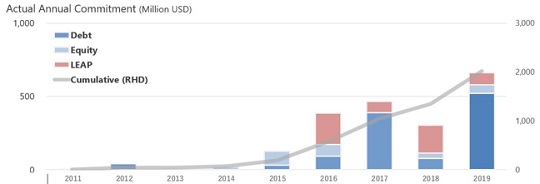Boosting Ghana's cocoa industry: Private-Sector Investment Finance to support the growth of private sector in developing countries
2020.12.11

A cocoa farm in Ghana. JICA provides loans to COCOBOD, which supports approximately 800,000 farmer households. Such support will improve their livelihoods
As the demand for infrastructure and other development projects in developing countries expands, expectations are growing for direct private-sector investment in addition to Official Development Assistance (ODA). However, the reality is that private-sector investment in developing countries have various risks, and their financial needs are not being properly addressed. Under such circumstances, attention is now focusing on “Private-Sector Investment Finance (PSIF),” in which JICA provides financing to private companies that are implementing projects in developing countries.
This year, JICA provided $100 million (approximately 11 billion yen) in PSIF to the Ghana Cocoa Board (COCOBOD), a fully state-owned company, for the management of cocoa bean production and distribution.
This is a case of self-sustaining fund-raising by a company that supports cocoa bean farmers and plays a central role in the cocoa industry without relying on the financial support of the Ghanaian government. This fund-raising directly supports the sustainable growth of Ghana's major industry and is expected to have a strong impact on development.

PSIF programs are available as a form of loan assistance for the private sector
Explaining how this came about, OWADA Kei, deputy director of the JICA PSIF Division says, “Although COCOBOD is under the supervision of the government, it is financially independent of the state and has, so far, been able to raise short-term funds from commercial financial institutions. COCOBOD requested long-term financial support for the sustainable growth of farmers' cocoa production and related industries because commercial financial institutions alone could not meet their needs. It was, therefore, decided to utilize PSIF, a financial support scheme, for the private sector.”
Ghana is the second-largest cocoa bean producing country in the world. Approximately 70% of the cocoa, the raw material for chocolate, imported by Japan comes from Ghana. COCOBOD purchases cocoa beans produced by farmers on an international market price basis, monitors their quality, and then sells them domestically and internationally. JICA has long cooperated with COCOBOD in strengthening its inspection capacity for cocoa beans production and marketing through technical cooperation projects. This has resulted in supporting the stable export of Ghana's cocoa beans. However, there were also many challenges to maintaining their production and distribution.

Cocoa at a farm in Ghana (left) and the drying process of cocoa berry harvested at the farm (right)
This PSIF for COCOBOD will enhance the productivity of cocoa farmers and cocoa-related industries. JICA’s loan will be used for the replanting of cocoa trees, which is difficult for cocoa farmers to undertake due to budgetary constraints. It will also be used to develop warehouses necessary for distribution. The project aims to improve the income of cocoa farmers and create new jobs, and to help address poverty and employment issues, which have been an on-going problem in the region. Furthermore, the project seeks to contribute to a stable supply of high-quality cocoa to Japan in the future.
“Ideally, private projects should be able to raise their funds from private financial institutions and other sources for their business development. However, in developing countries, there are some private projects that are unable to obtain sufficient funds from a private sector due to various risk factors, despite their potential for growth and necessity. In such cases, we encourage the implementation of projects by having them take advantage of the investment and financing schemes of JICA and other development financial institutions. Of course, it is also possible to use a combination of PSIF together with private financial resources,” says Mr. Owada, explaining the relationship between JICA's PSIF and private-sector financial institutions.
He added, “The participation of public institutions like JICA in investment and financing will enable recipient companies to take advantage of networks with developing country governments that JICA has built up over the years. Moreover, other private-sector financial institutions and investors appreciate JICA's presence in developing countries. One other important aspect is the ‘mobilization effect,’ which helps them to feel more comfortable with the investment and financing.” The balance between private-sector funding, Japanese ODA loans to governments, and PSIF will lead to the resolution of issues in developing countries.
JICA currently administers PSIF projects in 14 countries (four regions), and the cumulative total of approved projects since 2012 has reached approximately 220 billion yen ($2 billion) as of 2019. As the demand for private-sector business development funds in developing countries is growing immensely toward the achievement of the SDGs, the need for foreign investment and financing support is also expanding. Against this backdrop, JICA will further promote the use of PSIF projects in 2020 and beyond.

Annual commitment of PSIF projects. Full-fledged implementation since fiscal 2015, with a sharp increase in fiscal 2019 (LEAP is the “Leading Asia's Private Infrastructure Fund,” which is funded by JICA)
scroll